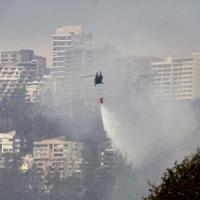Ecuador’s capital Quito, already suffering from a series of violent gang incidents, is now facing fires with scarcity of water due to the country’s worst drought in six decades.
“It feels like punishment,” said 56-year-old Fernando Muirragui, whose house narrowly avoided the flames believed to be started by arsonists.
The hardships just keep adding up,” complained Rolando Marcillo, a 60-year-old carpenter in the fire-affected Bellavista neighborhood, calling the fires “the final straw.”
Ecuador is among several South American countries combatting unprecedented wildfires that have destroyed millions of acres amid one of the most severe droughts in years, attributed by experts to climate change.
The Andean country has seen virtually no rain for nearly three months, leaving it extremely dry.
So far this year, it has experienced 3,300 forest fires that have consumed almost 38,000 hectares of land.
Quito, a city with around three million residents located at a height of 9,350 feet (2,850 meters), has been battling fires for three weeks.
On Tuesday, five new fires erupted simultaneously on the eastern outskirts of the capital, some of which were still burning a day later despite the efforts of approximately 2,000 firefighters, soldiers, and rescuers.
One individual has been detained on suspicion of intentionally starting one of the fires.
Six people have been hurt and about 100 families relocated to safety as residents struggle to protect their homes with buckets of water carried over long distances.
– Financial Loss –
The timing of the fires could not be worse, with 20 out of Ecuador’s 24 provinces on “red alert” due to the drought.
The nation, heavily reliant on hydroelectric power, is facing severe energy deficits and has implemented rolling power cuts of up to 12 hours a day, while drinking water is becoming increasingly scarce.
The business sector estimates losses of around $12 million per hour of lost power.
“We are losing money because we cannot sell perishable items like beverages, especially as demand has risen,” said 77-year-old grocery store owner Ana Topon.
“We are purchasing fewer perishable goods like meat, which we are unable to store due to the risk of spoilage” as refrigerators and freezers are more often off than on.
As farmers struggle to keep plants and livestock hydrated, consumers are beginning to feel the impact of rising prices.
“Everything is becoming more expensive due to the drought,” said 59-year-old homemaker Consuelo.
“A bag of vegetables still costs a dollar, but it contains fewer tomatoes, onions, and peppers, and the vendors think we won’t notice.”
About 40,000 hectares of crops have been affected by drought and fire, according to Agriculture Minister Danilo Palacios.
– ‘Criminals capitalizing’ –
Quito residents are grappling with multiple crises.
In addition to food shortages, price hikes, and fires, they also fear armed gangs taking advantage of the chaos.
The once peaceful country of 17 million people has seen its homicide rate increase eightfold in five years as gangs vie for control of the drug trade and clash with the authorities.
The violence has been mainly concentrated in prisons and port areas but has spilled over to Quito, where several confrontations have been reported recently.
A shooting at a salon resulted in five deaths last Friday.
Muirragui, whose home was nearly engulfed by flames on Tuesday, mentioned that the rise in criminal activity discourages people from evacuating their homes.
“You can’t leave your property unattended because criminals take advantage of your absence to steal,” he stated.
tip-pld/mlr/cb





